- Clone
- W18349F (See other available formats)
- Regulatory Status
- RUO
- Other Names
- High affinity immunoglobulin gamma Fc receptor I, IgG Fc receptor I, Fc gamma RI, FcRI, CD64, Fcg1, FcgR1
- Isotype
- Rat IgG2b, κ
- Ave. Rating
- Submit a Review
- Product Citations
- publications
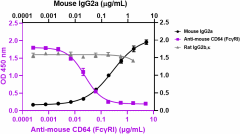
-

Biotin mouse IgG2a, κ isotype ctrl antibody (Cat. No. 400204) (black circles) binds to immobilized recombinant mouse FcγRI/CD64 (Cat. No. 773806). Ultra-LEAF™ purified anti-mouse CD64 (FcγRI) antibody (clone W18349F) (purple squares) inhibits the binding in a dose-dependent manner whereas the GoInVivo™ purified rat IgG2b, κ isotype ctrl antibody (Cat. No. 400666) (gray triangles) does not have the effect. This antibody blocks the binding of 2 µg/mL biotin mouse IgG2a, κ to 1 µg/mL immobilized recombinant mouse FcγRI/CD64. ND50 = 0.02 - 0.1 µg/mL.
| Cat # | Size | Price | Quantity Check Availability | Save | ||
|---|---|---|---|---|---|---|
| 941903 | 100 µg | 172€ | ||||
| 941904 | 1 mg | 836€ | ||||
FcγRI, also known as CD64 and FcR I, is a type I transmembrane protein, belonging to the immunoglobulin superfamily. FcγRI is an Fc receptor that binds to monomeric IgG with high affinity. Human FcγRI binds to human IgG1, IgG3 and IgG4 with higher affinity, but no affinity for IgG2. However, murine FcγRI only binds to mouse IgG2a with high affinity, but it binds to mouse IgG2b and IgG3 with low affinity and no affinity for mouse IgG1. Upon binding to IgG, FcγRI associates with signal-transducing FcR common γ chain, and in turn conducts downstream signaling. Though Fc γ chain is dispensable to FcγRI ligand-binding capacity, the surface expression of FcγRI and signaling are impaired in Fc γ chain-deficient cells. FcγRI is exclusively expressed on myeloid cells, including monocytes/macrophages, dendritic cells, and inducible on neutrophils and mast cells. The expression can be upregulated by IFN-γ, IL-10 and G-CSF stimulation. Several studies demonstrated that FcγRI plays a role in antigen capture, IgG-induced cellular phagocytosis and antibody-dependent cellular cytotoxicity (ADCC). In FcγRI-deficient mouse macrophages, the IgG2a-induced phagocytosis and antibody-mediated killing were impaired. In addition, acute and chronic inflammatory responses and immune complex-dependent antigen presentation to primed T cells were disturbed in FcγRI-deficient mice.
Product DetailsProduct Details
- Verified Reactivity
- Mouse
- Antibody Type
- Monoclonal
- Host Species
- Rat
- Immunogen
- Recombinant mouse CD64 (FcγRI)
- Formulation
- 0.2 µm filtered in phosphate-buffered solution, pH 7.2, containing no preservative.
- Endotoxin Level
- Less than 0.01 EU/µg of the protein (< 0.001 ng/µg of the protein) as determined by the LAL test.
- Preparation
- The Ultra-LEAF™ (Low Endotoxin, Azide-Free) antibody was purified by affinity chromatography.
- Concentration
- The antibody is bottled at the concentration indicated on the vial, typically between 2 mg/mL and 3 mg/mL. Older lots may have also been bottled at 1 mg/mL. To obtain lot-specific concentration and expiration, please enter the lot number in our Certificate of Analysis online tool.
- Storage & Handling
- The antibody solution should be stored undiluted between 2°C and 8°C. This Ultra-LEAF™ solution contains no preservative; handle under aseptic conditions.
- Application
-
Block - Quality tested
- Recommended Usage
-
Each lot of this antibody is quality control tested by blocking the binding of 2 µg/mL biotin mouse IgG2a to 1 µg/mL immobilized recombinant mouse FcγRI/CD64 (Cat. No. 773806). ND50 range: 0.02 – 0.1 µg/mL. It is recommended that the reagent be titrated for optimal performance for each application.
- RRID
-
AB_2892504 (BioLegend Cat. No. 941903)
AB_2892504 (BioLegend Cat. No. 941904)
Antigen Details
- Structure
- Immunoglobulin family
- Distribution
-
Monocytes, macrophages, dendritic cells and activated granulocytes
- Function
- Antigen capture, IgG-induced cellular phagocytosis, antibody-dependent cellular cytotoxicity
- Interaction
- FcγR subunit, src-type kinase Hck and Lyn, dendritic cells, granulocytes, macrophages, monocytes
- Ligand/Receptor
- Mouse IgG2a
- Cell Type
- Dendritic cells, Granulocytes, Macrophages, Monocytes, Neutrophils
- Biology Area
- Immunology, Innate Immunity
- Molecular Family
- CD Molecules, Fc Receptors
- Antigen References
-
- Van de Winkel JG, et al. 1993. Immunol Today. 14:215-21.
- Raghaven M, et al. 1996. Annu Rev Cell Dev Biol. 12:181-220.
- Ravetch J, et al. 2001. Annu Rev Immunol. 19:275-90.
- Takai T. 2002. Nature Rev Immunol. 2:580-92.
- Ravetch J, et al. 2000. Science. 290:84-9.
- Gene ID
- 14129 View all products for this Gene ID
- UniProt
- View information about CD64 on UniProt.org
Related FAQs
- Do you guarantee that your antibodies are totally pathogen free?
-
BioLegend does not test for pathogens in-house aside from the GoInVivo™ product line. However, upon request, this can be tested on a custom basis with an outside, independent laboratory.
- Does BioLegend test each Ultra-LEAF™ antibody by functional assay?
-
No, BioLegend does not test Ultra-LEAF™ antibodies by functional assays unless otherwise indicated. Due to the possible complexities and variations of uses of biofunctional antibodies in different assays and because of the large product portfolio, BioLegend does not currently perform functional assays as a routine QC for the antibodies. However, we do provide references in which the antibodies were used for functional assays and we do perform QC to verify the specificity and quality of the antibody based on our strict specification criteria.
- Does BioLegend test each Ultra-LEAF™ antibody for potential pathogens?
-
No, BioLegend does not test for pathogens in-house unless otherwise indicated. However, we can recommend an outside vendor to perform this testing as needed.
- Have you tested this Ultra-LEAF™ antibody for in vivo or in vitro applications?
-
We don't test our antibodies for in vivo or in vitro applications unless otherwise indicated. Depending on the product, the TDS may describe literature supporting usage of a particular product for bioassay. It may be best to further consult the literature to find clone specific information.
Other Formats
View All CD64 Reagents Request Custom Conjugation| Description | Clone | Applications |
|---|---|---|
| Ultra-LEAF™ Purified anti-mouse CD64 (FcγRI) | W18349F | Block |
Customers Also Purchased
Compare Data Across All Formats
This data display is provided for general comparisons between formats.
Your actual data may vary due to variations in samples, target cells, instruments and their settings, staining conditions, and other factors.
If you need assistance with selecting the best format contact our expert technical support team.
-
Ultra-LEAF™ Purified anti-mouse CD64 (FcγRI)

Biotin mouse IgG2a, κ isotype ctrl antibody (Cat. No. 400204...
 Login / Register
Login / Register 






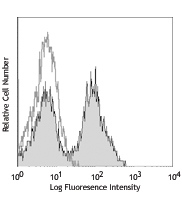
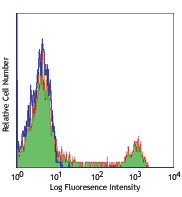
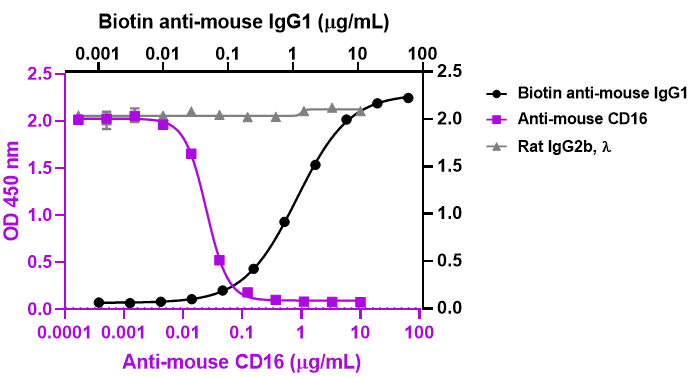
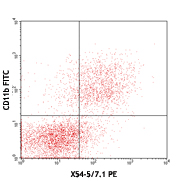



Follow Us